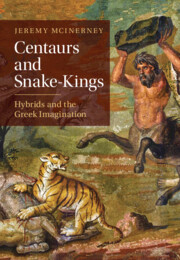Book contents
- Frontmatter
- Dedication
- Contents
- List of Figures
- Preface
- Acknowledgments
- Spelling and Orthography
- 1 Introduction: Encountering the Sphinx
- 2 ‘Welcome to Athens’: Theories of Hybridity
- 3 Hybrids around the Corrupting Sea
- 4 Hybrids, Contact Zones and Margins
- 5 Heads or Tails: Gorgons, Satyrs and Other Composites
- 6 Centaurs and Other Horses
- 7 Snakes and the Perils of Autochthony
- 8 Hermaphrodites and Other Bodies
- 9 Adynata, Ethnography and Paradox
- 10 Conclusions
- Bibliography
- Index
7 - Snakes and the Perils of Autochthony
Published online by Cambridge University Press: aN Invalid Date NaN
- Frontmatter
- Dedication
- Contents
- List of Figures
- Preface
- Acknowledgments
- Spelling and Orthography
- 1 Introduction: Encountering the Sphinx
- 2 ‘Welcome to Athens’: Theories of Hybridity
- 3 Hybrids around the Corrupting Sea
- 4 Hybrids, Contact Zones and Margins
- 5 Heads or Tails: Gorgons, Satyrs and Other Composites
- 6 Centaurs and Other Horses
- 7 Snakes and the Perils of Autochthony
- 8 Hermaphrodites and Other Bodies
- 9 Adynata, Ethnography and Paradox
- 10 Conclusions
- Bibliography
- Index
Summary
Human/snake hybrids played a significant role in the Athenian imagination: the snake’s connections with the earth expressed the Athenian claim to autochthony. This claim was complicated. For some aristocratic gene, autochthony marked them as superior to more recent arrivals, but the foundational myth of Athens, involving Hephaistos’ attempted rape of Athena, was tinged with incest and pollution, indicating some ambivalence towards autochthony. Traditions of snake-bodied kings reflected a conception of the past that was conceptually both near and far from the present. The hybridity of the snake-figured ancestor connected them to a deep past but also bridged the gap that separated the present and connected past from the plupast. This was a particular concern in the sixth century, as new notions of Athenian identity were taking shape. Bluebeard, the famous pedimental sculpture from the Archaic Akropolis, embodies this. Bluebeard can be identified as the Tritopatores, ancestral deities of the Athenians. These hybrids signify the continuous irruption of the deep past into the current world, a condition that produced a creative tension between order and chaos.
- Type
- Chapter
- Information
- Centaurs and Snake-KingsHybrids and the Greek Imagination, pp. 202 - 230Publisher: Cambridge University PressPrint publication year: 2024



